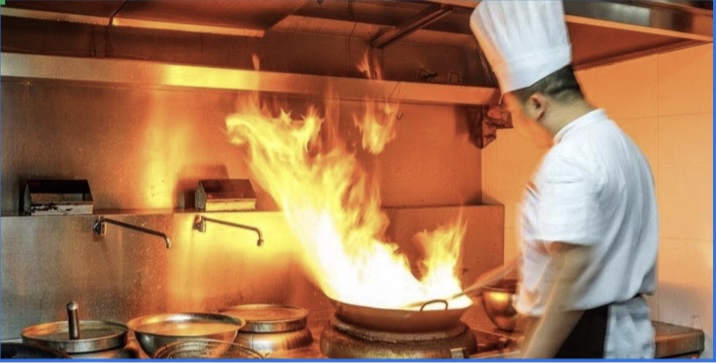One Business Day
Boston, MA–It’s 6:40 a.m.
In the cold hours of a winter morning, Wei Ding, the owner and top chef of My Happy Hunan Kitchen restaurant, rises before dawn. He starts preparing dumplings for his seven-month pregnant wife and his two eight-year-old twins, Jean and Sean.
Since the start of the pandemic, most restaurants have struggled to stay in business. About 20% of restaurants in Massachusetts have been forced to shut down. Many Asian restaurants in the Chinatown and Boston area are discriminated against.
“My life has been completely changed by COVID-19.” Mr. Ding said.
Wei Ding was once an award-winning chef in Changsha, Hunan Province, China. He was the executive chef of Huatian Hotel, a famous five-star hotel in Changsha, China.
Chef Ding founded his first restaurant in Changsha in 2010, called “Happy Gathering”, and expanded to fifteen locations in China. With this success, he and his family immigrated to Boston in 2017.
My Happy Hunan Restaurant is located in the bustling city of Brighton. It is a traditional Chinese restaurant and can accommodate more than 120 guests. The guests at the restaurant on a normal day are about 60% Asian, 20% White, 15% Latino, and 5% Black.
At 7:45 a.m.

Jean and Sean. Photo by Wenjing Ding
After breakfast, Wei Ding begins to send two kids to Roger Wellington school.
YinHua Li, Wei Ding’s wife, is sometimes perceived as a restless, impatient woman, but with a finger-snap temper, but she has a good heart. Wei Ding and his wife have completely different personalities, but they were an easy-going, happy couple, with an affection that runs deep and true. YinHua used to work the dayshift at My Happy Hunan Kitchen. Everybody in the restaurant knows her. Wei Ding and YinHua are expecting a new baby now, so she stopped going to the restaurant and just takes orders at home every day.
Now, at 8:30 a.m.
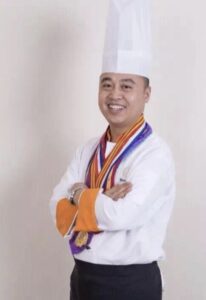
Wei Ding. Photo courtesy by Wei Ding
Wei Ding arrives at the Chinese supermarket in Chinatown to purchase the ingredients for the day.
Mr. Ding has a good sense of humor, and within the Chinese community, most people know him, and he knows them. He doesn’t speak much English, but if you pass him on the street, you get a smile and a wave and maybe a funny joke or a greeting with a heavy Chinese accent, “Hello, hello, how are you?” or “Thank you, thank you”.
Wei Ding is a round man with short sandy hair and the preoccupied air of someone who is always thinking about how to make great food. Opening a Chinese restaurant is his American dream. He loves food and enjoys bringing people together, so it was very important for him to create a restaurant environment that expresses the culture of Hunan in a friendly, authentic way.
When sixteen-year-old Wei Ding was helping his grandmother prepare a Chinese Lunar New Year dinner, he fell in love with the process of making golden beef soup. This soup is a really special home-cooked dish, the soup made of beef, enoki mushroom, pumpkin and a peppery spice of red-hot chili peppers. It takes twenty-four hours to cook. He promised himself that he’d become a famous chef and continue making his favorite golden beef soup recipe. Now, golden beef soup is the most ordered item at the restaurant. This is also his unique way of connecting to his family.
************
On March 16, 2020, Governor Baker declared that all restaurants must shut down indoor dining. That cancellation continued through the fall. Due to the new policy, and the misunderstanding of the former president Trump (Trump has said that the virus comes from China, that’s why no one wants to eat Asian restaurants.) the restaurant’s income has dropped by 80%.
It is 9:30 a.m.
Wei Ding arrived at the restaurant and met his co-founder De Wu to discuss the day’s work plan.
“Hey buddy, how are you?”
“Great! how are you doing?”
De Wu is a tall young co-founder and Head chef who wears his shirt tucked in and his hair combed neatly back from his forehead. He gets to the restaurant at about 9:30 a.m. every morning. Chef Wu immigrated to Boston in 2016 and worked as top Chef at Sumiao Hunan Kitchen in Cambridge. In 2020 Chef Wu partnered with Wei Ding as co-founder of My Happy Hunan Kitchen.
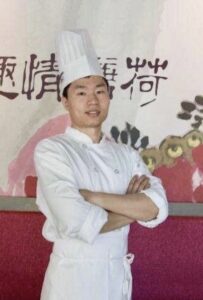
De Wu. Photo courtesy by Wei Ding
De Wu is lean and lanky. He has experienced the difficulties of working hard to achieve the American dream through many days of exhaustion, isolation, disillusionment, and a growing sense of frustration, but in spite of these challenges, co-founder Mr. Wu always remains positive. He is an indispensable partner to Wei Ding.
“Every single day I will find a reason to be thankful and to have a smile on my face.” De Wu said.
He has a good sense of humor and a lot of folks saved their best jokes for Mr. Wu, just to see his quick and sometimes mischievous-looking smile.
As an only child, Chef Wu has never had a chance to return to China since he came to the United States five years ago. Actually, he said he had planned to return to China in the summer 2020 so that friends and family can introduce him to potential girlfriends. Unfortunately, the pandemic happened and restricted his travel. He feels the pressure of his parents’ desire to see him starting a family from thousands of miles away.
“It is bad, really bad…. If we don’t want to shut down, we have to find a way to survive – by increasing deliveries, by laying off some of the staff, and by reducing costs. ” Wei Ding said.
“I totally agree,” Wu responded.
During that critical period in 2020, they made the decision to lay off 60% of restaurant staff so they could collect unemployment. Before the pandemic, Wei Ding’s restaurant had Eighteen employees. Currently, the restaurant only has five staff in the back of the kitchen and one staff in the front. They hope to hire everyone back after the pandemic.
The survival of the restaurant from the worst days of the pandemic when all dining stopped, to now is an incredible story.
In order to keep the business alive, they have formulated a special pandemic menu. They also increased their outside deliveries and customers who make online orders can get a 15% discount with the “WeChat 15” code.
************
It is 10:20 a.m. and the chefs are preparing the ingredients.
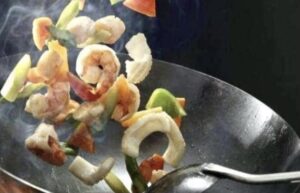
Happy Spicy Shrimp. Photo by Wenjing Ding
Du Wu and Wei Ding prepare the soy sauce, Chinkiang vinegar, Shaoxing wine, peanut oil, ginger, green onions, and garlic, green chili, red pepper, sour chili, and cook the rice.
Ding…ding…ding…. The first order is coming. The time is 10:45 a.m.
“Golden beef soup, General Tso’s Chicken (not spicy), Stir-fried Pork – Delivery via UberEATS.
Ding…ding…ding…. The orders roll in.
“Golden beef soup & Kung Pao Chicken Century Egg – Delivery to Lexington.
“Stir Fried Beef Tongue (no spicy) & Jian Dui – Delivery to Newton.
“Ginger & Scallion Chicken & Pork Soup Bao” Delivery to Brookline.
“Stir-fried Pork & Stir-Fried Cauliflower” Delivery to Brighton.
“Hunan Fried Rice & Scallion Pancake & Plum Juice.” # 121 Order for pick-up.
Fortunately, this discount promotion attracted some customers. But the operating income is still low. Many operating costs remain fixed, including high costs for rent, utilities, gas, sanitation, employee salaries etc. So, money is still tight.
“No matter how difficult it is, we never give up. We are not shutting down.” Wei Ding said.
During the pandemic, Wei Ding & De Wu worked more than twelve hours a day. In order to save on labor costs, they did not take a day off for more than three months.
De Wu’s right hand was swollen and painful when he cooked, the beginnings of arthritis, but nobody noticed.
************
The clock says 2:30 p.m. School pickup time.
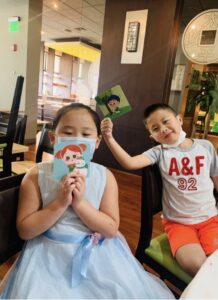
Jean and Sean will be taken back to the restaurant by their father after class and do their homework until the restaurant is closed. Photo by Wenjing Ding
Wei Ding had to rush to Roger Wellington kids’ school before 3 p.m. to pick up his children’. Then he comes back to the restaurant at 3:30 p.m. He needs to prepare to deliver 500 free lunches tomorrow.
Most of Asian restaurants provide employees with free lunch and dinner. Normally, after taxes, most cooks pull in $4,500 to $5,000 a month, making approximately $60,000 a year. Waiters and cashiers can earn $2,500 to $3,500 a month, around $40,000 a year. However, during the pandemic, something has changed.
“We love the Happy Hunan Kitchen restaurant. Don’t close!” a customer, Irving, says.
“You are not alone; we are always here for you,” a Chinese student, Zhang, says.
“Thank you for still being there for us!” Andrew says.
“I like this restaurant. It’s not just the food, it’s the Chinese culture,” Apple says.
Mr. Pen, 55, was the first customer to pay a large tip ($200) to support the restaurant to keep it from closing.
Apple Li, 40, is a Chinese professor at Harvard Graduate School of Education. She was the second customer to pay a large tip ($150) to support the restaurant so it could stay open.
Liang Cai, 60, a professor at Northeastern University. He will order food more than $100 for take-out at three O’clock every Saturday.
“We’re incredibly grateful for our customers who keep us going every day.” De Wu said.
In order to appreciate the community and customers for their great support to the restaurant, over the last 10 months, My Happy Hunan Kitchen was able to donate over 500 free lunches to healthcare workers, the fire department and to International students. There are five schools in the Boston area that have accepted the free lunches (Harvard, MIT, BU, BC, and Emerson).
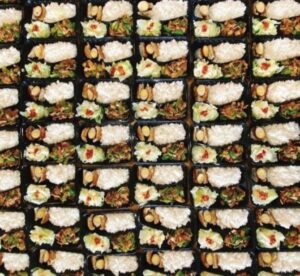
Free Lunch. Photo courtesy by Wei Ding
The restaurant has continued to support the community by giving donations and working with local groups to improve their relationship.
************
At 3-5 p.m. Delivery
During the busy take-out hours, De Wu hops in his car with bags of warm food and delivers them to customers. Few know he owns the restaurant when he hands over the food.
“Life in the United States is good and bad! Have to pay for the harvest!” Wu said.
He clarifies that “have to pay the harvest” is a Chinese idiom that means, essentially, “no pain, no gain.”
Ms. He is a sixty-year-old waitress who spends seven days a week in the kitchen. She is from Fujian, China, a province on the country’s southeastern coast. Ms. He, who was wearing traditional white waitress clothes, is a small, enthusiastic, pale, and pretty woman, with a quiet, satisfying smile and a shining light in her eye—the kind of Chinese woman you would want to talk with for hours. She helps cut vegetables & meat, wash dishes, and clean. She never complains and was the most effective helper in the restaurant during the pandemic.
“Ms. He is the best employee we ever have.” De Wu said.
Cashier Amanda Izzo is a young, pretty talkative woman with strawberry blond hair and a quick laugh, she is the only American girl left in the restaurant, and she also works 12 hours a day. She is not only a cashier, but also the waitress, translator, and takeaway person. She has been deeply influenced by the Chinese community around her. She enjoys working at My Happy Hunan Kitchen, and this job also helped her through the difficulties of the pandemic, because the restaurant provides all the income for her and her family.
Wei Ding and De Wu are always there for the restaurant staff. “Whether it’s a takeout order, a compliment to the chef, a positive review, or a high five for a team member they’ve been missing, these little things add up to have a huge impact on their ability to stay strong,” according to Amanda.
************
It is 6:30 p.m.
It was a busy day for Wei Ding and his staff. Mr. Ding works in a big square kitchen with four stoves burning at the same time.

Photo courtesy by Wei Ding
Wei Ding says, “There are hundreds of cooking methods in China, but the most common methods are stir-frying, deep-frying, shallow-frying, braising, boiling, steaming and roasting. I like stir-frying the best and I use a wok at high heat, adding plenty of oil followed by all the ingredients and seasonings.” The stir-fried meat is juicy and tasty, and the vegetables are tender and crispy.
The specials at My Happy Hunan Kitchen that night, according to the green felt-tip lettering on the white board above the restaurant, were: “All You Can Eat General Tso’s Chicken, $9.99” and “Stir-fried Pork w. Long Hot Pepper and, Edamame, $15.99.” The soup of the day was cheesy mushroom soup.
Ding…ding…ding…. The orders roll in again…
“General Tso’s Chicken” Delivery to Panda.
“Stir-fried Pork w. Long Hot Pepper and Edamame” Delivery via Door Dash.
“General Tso’s Chicken” # 157 Order for pick-up.
By the time De Wu walked back into the kitchen after delivering at about 7:45 p.m., they received a total of 36 orders in the evening. The estimated gross income for the day would be around $8,000. For them, this is a successful day.
At 7:45 p.m. Delivery to Boston.
At 8:15 p.m. Delivery to Cambridge.
At 8:40 p.m. Delivery to Newton.
At 9:10 p.m. Delivery to Chinatown.
At 9:32 p.m. Delivery to Belmont.
At 9:50 p.m. Delivery to Burlington.
************
It is 10 p.m.
Ding…ding…ding…. The last orders roll in.
“Golden beef soup & Stir-fried Pork w. Long Hot Pepper” Order for pick-up as soon as possible.
Back in the kitchen, Ms. He is cleaning the stove and Amanda is washing the floor. Mr. Wu is preparing tomorrow’s food list.
The life of a Chinese restaurant owner and chef is grueling and monotonous. Each day begins the same way; The staff report to the restaurant around 10:20 a.m. and then spend the next twelve hours prepping ingredients, and then cooking the food by maneuvering a wok at scorching temperatures until closing at 11:00 p.m.
************
At about 11:45 p.m. – It is time to go home.
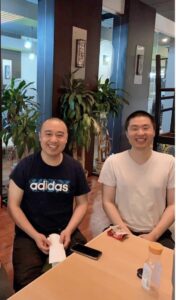
Wei Ding & De Wu completed one business day. Photo by Wenjing Ding
Wei Ding turned off all the lights and was ready to go home.
The restaurant is a 30-minute drive from his house, so normally Mr. Ding and Mr. Wu will go to a Japanese bar close to My Happy Hunan Kitchen and drink a glass of beer to relieve the fatigue of the day. He didn’t hit the road until 12 a.m. But then again, he just wanted to relax, and to have a bit of free time on his own.
************
It is 12:30 am and the day is over.
Wei Ding arrived home, showered off the kitchen grease, prepared for tomorrow’s breakfast ingredients, and went to sleep knowing he would be doing it all over again the next day.
He has lived that reality for the past 5 years.
